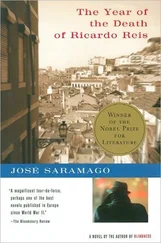Returning to the cave, he went to look at his little son, asleep in the manger, before telling his wife that he had found work. He thought to himself, He’ll die, he must die, and his heart grieved, but then he reflected that by the natural order of things he himself would die first and that his departure from the land of the living would bestow on his son a limited eternity, a contradiction in terms, an eternity that allows one to go on for a little longer when those whom we know and love no longer exist.
Joseph had been careful not to mention to the head carpenter that he would be staying only a few weeks, five at the most, enough time to take his son to the Temple to complete Mary’s purification, and to pack their belongings. He said nothing rather than be turned away, which shows that the carpenter from Nazareth was not familiar with working conditions in his own country, no doubt because he thought of himself, and rightly, as his own master and took little interest in the rest of the working community, which then consisted almost entirely of casual labor. He kept careful count of the remaining days, twenty-four, twenty-three, twenty-two, and to avoid making mistakes he improvised a calendar on one of the cave walls, nineteen, drawing lines that he then erased one at a time, sixteen, watched by an admiring Mary, fourteen, thirteen, who thanked the Lord for having given her, nine, eight, seven, six, such a clever husband, who could turn his hand to anything. Joseph told her, We’ll leave after we go to the Temple, for it’s time I got back to my work in Nazareth, where I have customers waiting, and she tactfully suggested, rather than appear to be criticizing him, But surely we cannot leave without first thanking the woman who owns the cave and the slave who helped deliver our child and who still calls every day to see how he’s coming along. Joseph made no reply. He’d never admit to having overlooked such an act of common courtesy, although he had intended to load the donkey beforehand, tie it up during the ceremony, then set off for Nazareth without wasting any time on thanks and farewells. Mary was right, it would have been ill-mannered to go away without so much as a word of gratitude, but if truth, poor thing, were to be known, Joseph was somewhat lacking in manners. To be reminded of this omission caused him to sulk and become irritable with his wife, behavior which usually served to ease his conscience and silence remorse. So they would stay on for two or three days, make their farewells as was only fit and proper, and leave the inhabitants of Bethlehem with a favorable impression of this devout family from Galilee, courteous and dutiful, notably different when one considers the low opinion the inhabitants of Jerusalem and its environs generally have of people from Galilee.
The memorable day finally arrived when the child Jesus was carried to the Temple in the arms of his mother, who rode the patient donkey that had accompanied and assisted this family since the beginning. Joseph led the donkey by the halter, he was in a hurry to get there, anxious not to lose a whole day’s work, even though their departure was imminent. The next day they were on the road as dawn dispersed the last vestiges of night. Rachel’s tomb was already some distance behind. When they passed it, the façade had taken on the fiery hue of a pomegranate, so unlike its appearance at night, when it became opaque, or in the light of the moon, when it looked deathly pale. After a while the infant Jesus woke up, and had scarcely opened his eyes when his mother wrapped him for the journey, and he cried to be fed in that plaintive voice, the only voice he has so far. One day, like the rest of us, he will learn to speak with other voices, which will enable him to express other forms of hunger and experience other tears.
On the steep slopes not far from Jerusalem the family merged with the pilgrims and vendors who were flocking to the city, all intent on being the first to arrive but cautiously slowing down and curbing their excitement when they came face to face with the Roman soldiers who were moving through the crowd in pairs, or with a detachment of Herod’s mercenary troops, who recruited every imaginable race, many Jews, as one might expect, but also Indumaeans, Galatians, Thracians, Germans, Gauls, and even Babylonians, who are unrivaled as archers. A carpenter who handles only peaceful weapons such as the plane, adze, mallet, or hammer, Joseph becomes filled with such fear and revulsion when he runs into these louts that he can no longer behave naturally or disguise his true feelings. He keeps his eyes lowered, and it is Mary, who has been shut away in the cave for weeks with no one to talk to apart from the female slave, it is Mary who takes a good look around, her dainty little chin held high with understandable pride, for she is holding her firstborn, a mere woman yet capable of giving children to God and her husband. She looks so radiant and happy that some Gauls, fierce, fair, with large whiskers, their weapons at the ready, smile as the family passes, their cruel hearts softened by the sight of the young mother with her first child. Smiling at this renewal of the world, they bare rotten teeth, but it’s the thought that counts.
There is the Temple. Viewed at close quarters, the building gives one vertigo, a mountain of stones upon stones which no earthly power seems capable of dressing, lifting, laying, and fitting, yet there they are, joined together by their own weight, without mortar, as if the entire world were a set of building blocks. The uppermost cornices, seen from below, appear to graze the sky, like another but quite different Tower of Babel, which even God will be unable to save because it is doomed to the same destruction, confusion, and bloodshed. Voices will ask, Why, a thousand times, believing there must be an answer, but eventually they will die away, because it is better to be silent. Joseph goes off to tether the donkey in the caravansary set aside for the animals. During Passover and other religious feasts the place gets so crowded that there is not enough room for a camel to shake the flies from its tail, but it is easier now that the last day of the census has passed and travelers have returned to their homes. In the Court of the Gentiles, however, which is bordered by colonnades on all four sides, with the temple precinct in the center, there is a large crowd, money changers, bird catchers, merchants trading lambs and kids, pilgrims gathered here for one reason or another, and numerous foreigners curious to visit the famous Temple built by King Herod. But the court is so spacious that anyone on the far side looks no bigger than an insect, as though Herod’s architects, seeing through God’s eyes, wanted to show the insignificance of men in the presence of the Almighty, especially if they happen to be Gentiles. As for the Jews, unless they have come for a leisurely stroll, their goal is the middle of the court, the center of their world, the navel of navels, the Holy of Holies. That is where the carpenter and his wife are heading, that is where Jesus is carried after his father purchases two turtledoves from the steward of the Temple, if such a title is appropriate for one who benefits from the monopoly on these religious transactions. The poor birds are ignorant of the fate that awaits them, though the smell of flesh and singed feathers lingering in the air does not deceive anyone, to say nothing of the much stronger stench of blood and excrement as oxen, dragged away to be sacrificed, foul themselves in terror. Joseph cradles the doves in the palms of his callused hands, and the poor birds, in their innocence, peck with satisfaction at his fingers, which he curves to form a cage. It is as if they were trying to tell him, We are happy with our new master. But Joseph’s skin is far too rough to feel or decipher the affectionate nibbling of the two doves.
Читать дальше












